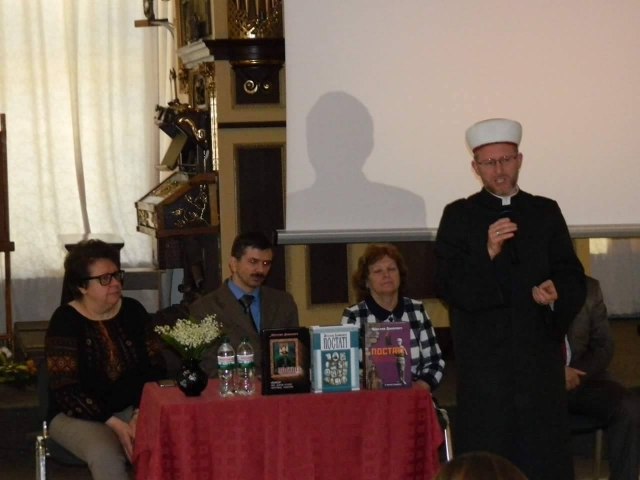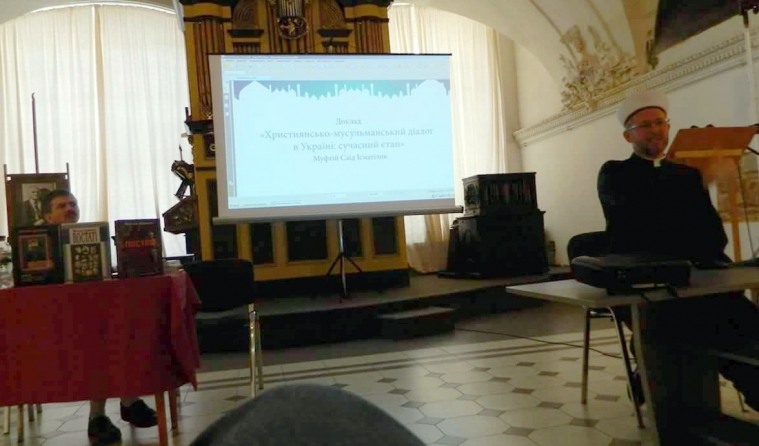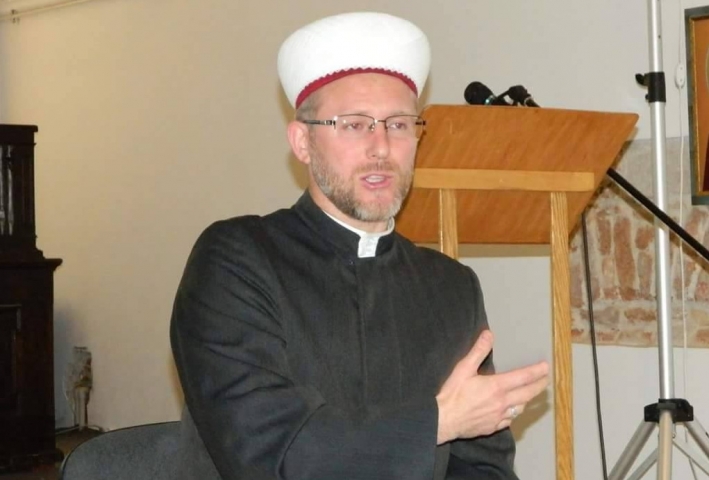During 24 — 26 of May, the XXVI International Scientific Conference on "History of Religions in Ukraine" was held in Lviv. Commemorated to the 90th anniversary of Doctor of History, Professor Yaroslav Dashkevych, the event gathered the leading scientists from Ukraine and other countries, priests, members of religious communities, public officials and other people concerned.
Among those invited to participate in the international conference also was the mufti of the Religious Administration of Muslims of Ukraine "Umma", Sheikh Said Ismagilov.
Topics, which were suggested for discussion by the organizers of the scientific forum, were the following: The Christianity in the pre-modern era; state, religion and society; confessions, national movements and totalitarian regimes; philosophy, political science and sociology; a separate section was devoted to sacred art. The scholars considered interconfessional relations as well as the relations between church and state, including those ones that were during the Soviet Union period, also they mentioned the Soviet system of punishment for the faith (in particular, the repressive policy in Western Ukraine, incidents, happened in 1946, — Lviv pseudo synod, liquidation of the Ukrainian Greek-Catholic Church and monastic communities, imprisonment of priests, and so on).
Much attention was paid to contemporary issues. In particular, problems and prospects of Religious Science in Ukraine were the topics that the scientists, well-known far beyond our country, talked about on their lecture. These scientists are Anatolii Kolodnyi, honored worker of Science and Engineering, President of the Association of Ukrainian Religious studies Scholars, Deputy Director of the Department of Religious Studies at Philosophy Institute GSSkovoroda under NAS of Ukraine and Liudmyla Fylypovych, the head of the department of History of Religions and Practical Religious Studies at Philosophy Institute GSSkovoroda under NAS of Ukraine.
Said Ismagilov, the mufti of RAMU “Umma”, gave a talk on the modern period of the Christian-Muslim dialogue in Ukraine, during which he also touched on military conflicts, large wave of migration, hybrid wars and terrorism.
— All these problems affect us, because Ukraine is a part of Europe — said Sheikh Said. — I mean military conflicts, hybrid war, migration, risk of Islamophobia. We must somehow overcome these phobias. To punish the criminals it is the right of relevant authorities — police, security services, etc. And the dialogue, the search for understanding between Muslims, Christians and followers of other faiths are the competence of religious and public figures, and, perhaps, politicians. What can Ukraine offer to Europe and other countries? She can offer our experience in establishing a dialogue and integrating Muslims into European society.
As during the conference it was talking about the so-called "clash of civilizations" (a term was introduced by Samuel Phillips Huntington, American political scientist, Director of the Institute for Strategic Studies at Harvard University, author of "The theory of Huntington" about the clash of civilizations in the modern era), Said-hazrat took his position on that process:
— I consider that the clash of civilizations has already begun — but in different way than Huntington thought — Sheikh Said said. — It is not a clash of "the Western world" and "the Muslim world". But this is a clash of the Western and the pro-Russian post-Soviet worlds. And Muslims, like Christians, could be on one side as well as on another of that clash that we are witnessing nowadays: ISIS actually acts on behalf of Russia and its allies, and Turkey is an actor on behalf of Western civilization in this confrontation.
Answering a question on: do we actually need the cross-cultural and interreligious dialogue, Said Ismagilov says:
— The dialogue is possible and necessary ... Believers (and not only Muslims) often ask me: "Why do we need this dialogue? Do we need it in order to all honest fathers should gather and talk to each other about nice things? ". And I reply: if all come to nothing more than pleasant words, so it will be also not bad. It is better to talk to each other, because the phobia and the distrust to each other appear when the dialogue and the familiarity are absent. But I think that the dialogue should not limit itself just to talks, we need teamwork. And at this point the question arises — how must this teamwork look like? In what way could this cooperation be demonstrated? I would answer in such way: there must be preaching, and protecting the interests of Ukraine, preaching moral values, active joint efforts in promotion and organization of volunteerism, chaplaincy and charitable programs, — said the Mufti.
After Said Ismagilov had returned from the conference, our correspondent had an opportunity to talk with him in order to clarify some statements. In particular, we asked him to give the examples of the possible cooperation of Muslims and non-Muslims.
— When the Muslim volunteers collect money, clothes, goods, food, for sending it to the ATO zone, everybody use it there: both Muslims and Christians. The medicines and foods, what we deliver to hospitals, are for all patients, no matter of their religion. When the Islamic Cultural Centre organizes a donor day — both Muslims and non-Muslims donate blood for saving the lives of Ukrainian citizens in a peaceful areas as well as in ATO region. When Muslim volunteers go every week to the children's home in order to bring the relief — they bring it to children of all nationalities and religions. When they take care about sick children-orphans, who need the rehabilitation, they do not ask about their origins. When I come to the regiment as a chaplain, both Muslims and non-Muslims come to me for consulting on certain issues or learning what Islam says about it.




